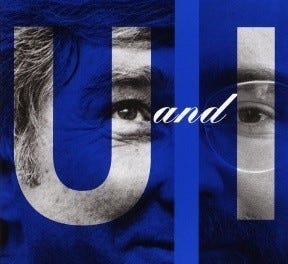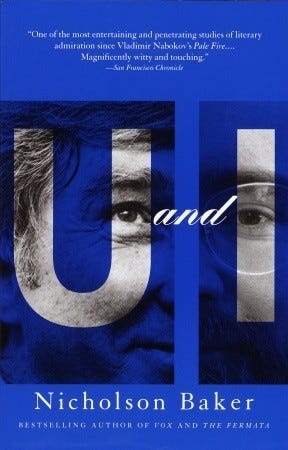This is Happiness by Niall Williams (2019)
U and I by Nicholson Baker (1991)
I imagined that I might be able to review these two books, recently read, while also extending my little thing on "aboutness." I imagined I would say something along the lines that Niall Williams's charming and nostalgic novel about an era in rural Ireland before the arrival of electricity is the type of novel that is safely "about something." While Nicholson Baker's eccentric novel about reading the work of John Updike, I planned to say, is the type of novel that defies description.
Except Baker's novel is listed among his non-fiction titles, right at the front of the book I had ploughed through nearly to the end. "It's a novel, surely," I'd convinced myself. I mean, okay, the narrator calls himself Nicholson Baker and positions himself as the voice of the author writing said book, but that's just a post-modern ploy. Right? No one would expect the reader to mistake Nicholson Baker for Nicholson Baker, it seemed to me. The narrator Baker flips back and forth in his positions, says ridiculously vulnerable things about himself, has an explosive rhetoric of praise and anxiety about Updike, and even Updike seems to become a character and not a representation of the novelist under analysis.
This is brilliant play, I intended to say. This is fiction as essay; essay as fiction.
I haven't read anything else by Baker, so I'm not going to venture more on this voice being his voice. Even as I accept now that U and I is non-fiction, I still believe the narrator is 50 per cent a put on. At least, right? Maybe all of these events are true: his mother reading him Updike as a teenager, his attempt to write an influential letter to The New Yorker after Barthelme's death, his two encounters with Updike. Sure, okay. But it's the dramatic personae that is the real gift here, and that is manufactured.
That is, the Baker as narrator is as manufactured as the laconic narrator of Williams's novel. One unfolds a tale of love, loss and bicycles in County Clare, as the telephone poles go up and rural cottagers prepare to receive appliances. As the wave of modernity enfolds them, in other words. A simple aboutness? What was I thinking? In any case, the other one now — the other narrator discusses his anxiety of influence while also confessing he's never read The Anxiety of Influence (1973).
U and I, I was going to say, is right up there with Flaubert's Parrot by Julian Barnes (1984), a portrait of the artist via the portrait of another artist. Showcasing things both seen and unseen at the same time. Or, in other words, things seen as the process of seeing them is also seen and filtered and spun, clouded over and blasted with bewildering light. No simple aboutness, for sure.
U and I is a remarkable achievement, though also, now, increasingly dated. Baker as narrator analyses the work of Updike through many filters, for example, but not the range of filters one would expect today. And here you are, reading me reading Baker reading Updike and I’m asking for a do-over. Be more specific? These are two white dudes with no apparent anxiety about their whiteness. Baker has some anxiety about his maleness, his straightness, his middle-class-ness, but not his whiteness. If he were to write U and I today, whiteness would feature.
Does This is Happiness deliver the goods? Is happiness discovered, codified? Sure, Olde Thyme Happiness. The warmth of hearth: family, community, forgiveness. The power of song. The coziness of stories with clear beginning, middles, and ends. The classics are reaffirmed here, but also complicated. Time marches on for everyone, and a melancholy pervades. Through the clouds, bright light shines. The darker the former, the brighter the latter.
Next month my book club discusses this one. I'm curious what folks will say.





